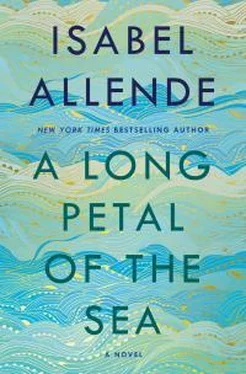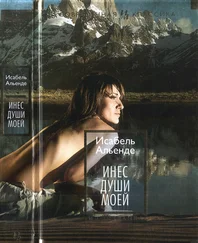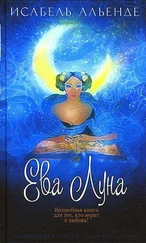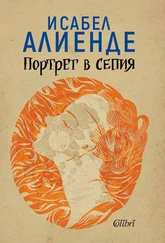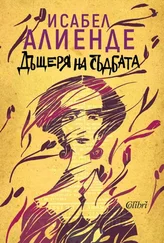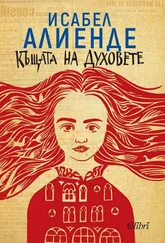“Nobody can. We’ll see. And don’t worry about paying for Chilean visas, as some consuls insist. I think it’s shameful to charge refugees for a visa. We’ll take care of that in Bordeaux as well.”
—
THAT SUMMER DAY, AUGUST 4, 1939, remained forever engraved on the minds of Victor Dalmau, Roser Bruguera, and the other two thousand or more Spaniards sailing toward that long, narrow South American country that clung to the mountains so as not to topple into the sea. None of them knew anything about Chile. Years later, Neruda was to define it as a long petal of sea and wine and snow… with a belt of black and white foam, but that would not have left the migrants any the wiser. On the map, it looked slender and remote.
The square in Bordeaux was teeming with people, a huge crowd that grew minute by minute, suffocating in the heat under a bright blue sky. Trains, trucks, and other vehicles crammed with new arrivals kept pulling up. Most of them had come straight from the concentration camps and were hungry, weak, and unwashed. Since the men had spent several months separated from their women and children, the re-encounter between couples and families produced dramatic, emotional scenes. They hung out of train windows, shouting when they recognized loved ones and falling sobbing into each other’s arms. A father who thought his son had died at the battle of the Ebro, two brothers who had heard nothing about each other since the Madrid front, a battle-hardened soldier who discovered a wife and children he had never expected to see again. And all this without any trouble, with a natural instinct for discipline that made the job of the French guards much easier.
Pablo Neruda, dressed from head to toe in white, together with his wife, Delia del Carril, also decked out in white and wearing a big, broad-brimmed hat, was overseeing the process of identification, health checks, and selection like a demigod. He was aided by consuls, secretaries, and friends seated at long trestle tables. Permission to board was granted with his signature in green ink and a rubber stamp from the Spanish Refugee Evacuation Service. Neruda solved the visa problem by issuing collective ones. The Spaniards were put into groups and had their photograph taken. Each one was quickly developed, and then someone cut out the faces and stuck them on the permits. Charity volunteers handed out snacks and toiletries for everyone. Each of the three hundred and fifty children received a complete set of clothes: Elisabeth Eidenbenz took charge of distributing them.
This was the day of departure, and the poet still needed a lot of money to pay for this immense transfer of migrants. The Chilean government refused to contribute, arguing that it would be impossible to justify the expense to a hostile, divided public at home. To everyone’s surprise, a small group of very formally dressed people suddenly appeared on the quay, volunteering to pay half of every passage. When Roser saw the group in the distance, she handed Victor the baby and ran to greet them. Among them were the Quakers who had taken her in. They had come in the name of their community to fulfill the duty they had set for themselves ever since their origins in the seventeenth century: to serve mankind and promote peace. Roser repeated to them what she had heard from Elisabeth, “You always appear where you’re most needed.”
Victor, Roser, and the baby were among the first to embark. The ship was an old nine-thousand-ton cargo boat that brought goods from Africa and had been used as a troop ship in the Great War. Built to accommodate twenty seamen for short voyages, it had been converted to take more than two thousand people for a month. Triple bunks had been built in the hold, and a kitchen, dining room, and sick bay with three doctors had been installed. As soon as the Dalmau family arrived on board they were assigned to their sleeping quarters: Victor with the men in the prow, Roser with the women and children in the stern. Over the next few hours, the lucky passengers finished coming on board, while several hundred other refugees had to remain at dockside as there was no more room.
At nightfall the Winnipeg weighed anchor with the high tide. On deck, some were weeping silently; others had their hands on their hearts as they sang the Catalan song of the emigrant: Dolça Cataluña / pàtria del meu cor / quan de tu s’allunya / d’enyorança es mor. Perhaps they knew in their hearts they would never return to their homeland. Pablo Neruda stood on the quay waving a handkerchief until they disappeared from view. That day was engraved on his memory too, and years later he would write: Critics can erase all my poetry if they wish. But this poem, that I recall today, cannot be erased by anyone.
The bunks were like niches in a cemetery: the refugees had to crawl into them and lie without moving on straw mattresses. Even so, this seemed to them the height of luxury compared to the holes they had made in the wet sand of the concentration camps. There was a latrine for every fifty people and three sittings for the dining room, which were strictly respected. Coming, as most of the passengers did, from wretched conditions and near starvation, they thought this was paradise: they had not had a hot meal in months. On the boat the food was very simple but tasty, and they could have second helpings of as many vegetables as they liked. They had been tormented by lice and bedbugs, and could now wash in basins with clean water and soap. They had been prisoners of despair, and now were sailing toward freedom. There was even tobacco! And beer and spirits in a small bar for those who could afford them. Almost all the passengers volunteered to help with the work on board, from the engine room to peeling potatoes or scrubbing the deck. On their first morning at sea, Victor introduced himself to the doctors in the sick bay. They greeted him warmly, lent him a white coat, and told him that several of the refugees showed symptoms of dysentery and bronchitis; there were also a couple of cases of typhus that had escaped the health authorities’ attention.
The women organized themselves to look after the children. They put up some barriers on deck to create room for a kindergarten and school. From the first day there was a nursery, games, art, exercise, and classes—an hour and a half in the morning, and an hour and a half in the afternoon. Like almost everybody else, Roser was seasick, but as soon as she could get up she began teaching the little ones to make music with a xylophone and drums made out of buckets. Once she had begun her lessons, the first mate, a Frenchman from the Communist Party, approached with the good news that Neruda had arranged for a piano and two accordions to be brought on board for her and anyone else who could play them. Some other passengers had a couple of guitars and a clarinet. From then on there was music for the children, concerts and dances for the adults, and a stirring Basque choir.
Fifty years later, when Victor Dalmau was interviewed on television about the odyssey of his exile, he said that the Winnipeg had been the ship of hope.
—
FOR VICTOR, THE SEA journey was a pleasant holiday, but Roser, who had spent several months comfortably installed in her Quaker friends’ house, suffered at first from the crowded conditions and the smells. She never dreamed of mentioning it (that would have been the height of discourtesy) and she quickly became so used to them she didn’t even notice. She put Marcel in a makeshift sling and went everywhere with him on her back, even while she was playing the piano. Victor took turns with the baby whenever he wasn’t working in the sick bay. Roser was the only one who could breastfeed—the other malnourished mothers could count on a reliable supply of bottles for the forty babies on board. Several women offered to wash clothes and diapers for Roser so that she wouldn’t spoil her hands. One peasant woman, toughened by years of hard toil, examined Roser’s hands in amazement, mystified as to how she could play the piano without looking at the keys. Her husband had worked collecting cork before the war, and when Neruda had told him there were no cork oaks in Chile, he replied drily: well, there will be. The poet thought this was a splendid riposte, and so accepted him on board, together with fishermen, farm and factory workers, manual laborers, and intellectuals as well, despite instructions from his government to avoid anyone with ideas. Neruda simply ignored that instruction: it made no sense to leave behind men and women who had defended their ideals so heroically. In his heart of hearts he was hoping they would rouse his country from its insular somnolence.
Читать дальше
